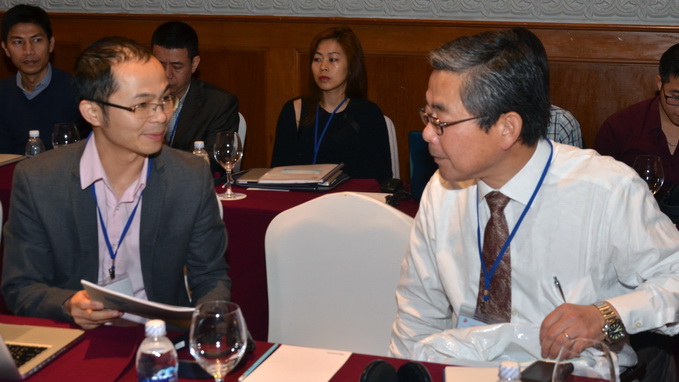An international conference on ASEAN and China-U.S. relations was held in Hanoi on Thursday, amidst recent developments in the relation between the two powerhouses.
The conference was co-hosted by the Diplomatic Academy of Vietnam (DAV) and the Konrad-Adenauer-Stiftung (KAS) office in Vietnam, attracting more than 80 renowned international and Vietnamese scholars.
The KAS is a Germany-based political foundation which seeks to intensify political cooperation in the area of development cooperation at the national and international levels through cooperation with governmental institutions, political parties, civil society organizations and handpicked elites.
The Association of Southeast Asian Nations (ASEAN) is a ten-member bloc which includes such Southeast Asian countries as Indonesia, Malaysia, the Philippines, Singapore, Thailand, Brunei, Cambodia, Laos, Myanmar and Vietnam.
Unlikely U.S.-China war
The conference focused mainly on proposals to enhance ASEAN’s central role in the regional security mechanisms, where the ASEAN must strike a balance in its relations with U.S. and China while attracting the participation of other global powers in regional institutions, looking to establish a regional order based on international laws and practices.
Mr. Kavi Chongkittavorn from the Institute of Security and International Studies, under the Bangkok-based Chulalongkorn University, asserted that China and the U.S. are lacking strategic trust in the Asia-Pacific region.
Chongkittavorn judged, however, that despite existing tensions over maritime interests at the East Vietnam Sea between China and the U.S., the prospect of a war between the two countries is extremely unlikely due to their economic ties.
In addition, Chongkittavorn said, both countries are playing increasing roles at hotspots of dispute in Asia such as the Korean Peninsula, East Vietnam Sea, or Taiwan Strait.
According to the Thai scholar, in order to maintain its central role in the face of growing influence from China and the U.S., ASEAN needs to promote consultations and dialogues with both nations in ASEAN-led mechanisms.
In particular, it must request that China join the Code for Unplanned Encounters at Sea (CUES), while accelerate the drafting of the Code of Conduct in the East Vietnam Sea (COC) and urge Laos and Myanmar to join the code.
ASEAN also needs to strengthen regional order on grounds of principles and expand its common visions on the political and security sectors.
ASEAN must promote and facilitate regional cooperation in such an ever-dividing and ever-changing world, Chongkittavorn concluded.
Meanwhile, Prof. Carlyle A. Thayer, from the Australian Defence Force Academy, identified four main reasons for China’s elevated practical invasion at the East Vietnam Sea, which are the nearing ruling by the Permanent Court of Arbitration (PCA) on the Philippines’ lawsuit against China, the upcoming election in the Philippines in May, America’s toughened actions in securing the freedom of navigation and overflight, and the upcoming U.S. presidential election in November.
Thayer believed that ASEAN had no other option but to fully implement the Declaration on the Conduct of Parties in the East Vietnam Sea (DOC) and moving forward to finish COC negotiations.
The Australian professor also warned ASEAN of the possibility that China would use COC to control the Philippines, Vietnam, and the U.S.
“The four pillars” at the East Vietnam Sea?
In the discussion session, one of the scholars raised a question on the prospects of a four-way strategic coalition among Japan, Australia, India, and the U.S. in Asia-Pacific in order to take on security challenges in the region.
Responding to this, Prof. Carl Thayer said that the unofficial four-way strategic coalition was the idea of the U.S., and that it could certainly become a reality.
Australia is considering the U.S.’s offer, while India has been expressing concerns about how to effectively increase their strategic autonomy, according to Prof. Carl Thayer.
In any way, theses nations do share common interests, and will continue to discuss with each other over the matter, he commented.
Prof. Tsutomu Kikuchi from the Department of International politics at Aoyama Gakuin University, Japan, added that three out of “the four pillars”, namely Japan, India, and Australia, had already been cooperating well with the others.
The naval forces of India, Japan, and Australia will further enhance their military and security collaboration, Kikuchi said, adding that many bilateral and multilateral cooperation mechanisms can be observed in reality.
Prof. Su Hao from the Department of Diplomacy at China Foreign Affairs University underlined China’s wish to be a peacekeeper responsible for activities at the East Vietnam Sea.
Hao admitted that China had been renovating islands and reefs at the East Vietnam Sea, but justified the activities by claiming they were not acts of aggression, but rather “naïve” acts that followed suit.
Hao agreed, however, that China needed to restrain their activities in the region.
Like us on Facebook or follow us on Twitter to get the latest news about Vietnam!





















































